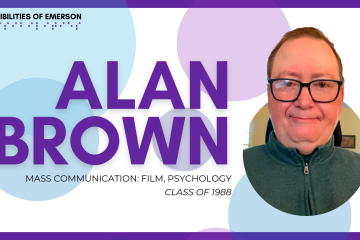Sara Morgan is a “Double Lion” alumna of Emerson College. In 2005, she received her B.A. in Communications with a focus on Audio/Radio and then went on to receive her M.A. in Integrated Marketing Communication in 2010. Throughout her career, Sara has worked as a marketing manager for law, education publishing, and higher education. Currently, she is the Global Brand Program Manager at SAI Global.

Sara Morgan ’05 & ’10
As an alumna that has their Master’s degree from Emerson, how has your program helped you in elevating your career?
Sara: “The Emerson network [of alumni] has hands down been the most valuable asset I gained from my time at Emerson. As an undergrad at Emerson, I worked full-time. It wasn’t until returning to Emerson for my Master’s that I was really able to immerse myself in the Emerson community, getting involved in all aspects of the college in true Emerson fashion. I began growing my network with a collection of contacts, friends, and colleagues from students I recruited working in Admissions, to classmates from my Master’s program, to professors and administrators I looked to for advice and guidance. This network of Emersonians would stay with me, grow and strengthen throughout my career.”
At the Emerson Career Development Center, we think about diversity and inclusion resources for students, but also what globalization could mean for their careers. As a Global Brand Manager, what are some best practices when working with clients outside of the United States?
“It’s extremely important to approach colleagues and clients from across the globe with an open mind and acceptance. You never know how someone’s communication or perspective has been shaped by their background, geography, political climate or even lack of knowledge of your perspective. You really have to start most conversations with a clean slate and not make any assumptions. I’ve learned fascinating things from international colleagues and classmates. Once you learn context, you have a better understanding of perspective and can adjust or nuance your approach and communication.”
There is a lot of conversation about professional allies, both for women supporting one another and men supporting women. What do you think makes for great allyship?
“Give a damn. There’s a difference in saying you stand for an issue and a willingness to speak up, show up, or take a stand even (and especially) when it may be uncomfortable. Being a great ally is having the ability to understand issues in a way that leads to taking actions, small or large, to help address issues that women continue to encounter professionally.
It’s also having a level of awareness. This could be as big as advocating for equal pay in your own workplace as a hiring manager or as small as being conscious to avoid microaggressions that may perpetuate stereotypes. This all contributes to continually and consciously contributing to progress being made when it comes to workplace equality and gender equity.”
For networking and establishing what we like to call “career communities” what advice might you offer femme-identified seniors who will soon be alumni?
“When building or growing your network, understand it takes time and effort to develop genuine connections. You don’t want to treat every person you encounter as just a transactional relationship. Think more about what you can learn from someone, rather than what they can do for you.
Inevitably someone will be able to help you along the way, and vice versa. Don’t discount anyone because of their current position or inability to help you, including peers. Show genuine interest in people’s career paths, seek guidance opposed to favors. Long-term connections will prove more valuable than short-term hiring contact. Some of my most valuable professional relationships have been a result of the most unexpected connections. Follow up, stay in touch, be gracious, you will be remembered for it.”


